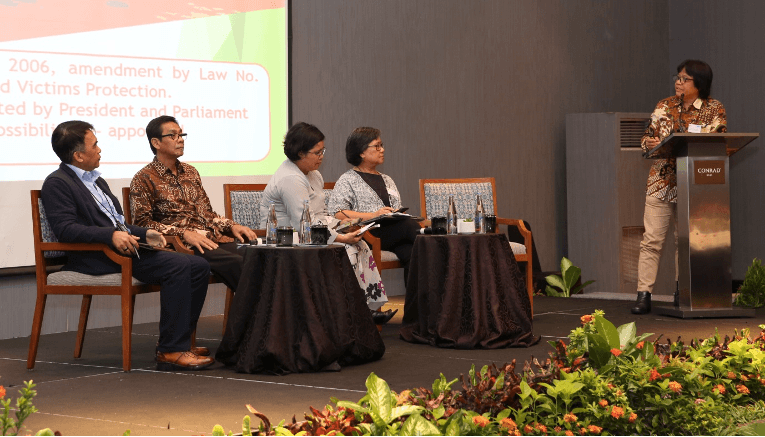Asia
A shift of policy direction at regional and national levels in Asia is spurring renewed attention on equitable and sustainable social and human development in alignment with the spirit and obligations of the UN Convention against Torture (UNCAT) and other human rights commitments. Adjusting from a reactive to a preventive approach, Asian countries are investigating how legislative, institutional and practical measures can de-incentivise and sanction improper behaviour, and at the same time, create positive environments which reinforce justice, efficiency and accountability. CTI is collaborating with a number of Asian States and other regional and national stakeholders to support Governments on this path.
In South East Asia in particular, States are in a process of developing their prevention frameworks, as reflected in the ASEAN Declaration on Culture of Prevention for a Peaceful, Inclusive, Resilient, Healthy and Harmonious Society of November 2017. CTI encourages these efforts in line with the spirit of UNCAT as well as that of the ASEAN Human Rights Declaration of November 2012 which prohibits torture and cruel, inhuman or degrading treatment or punishment, and recognises the right to liberty and security and to be free from arbitrary arrest, search and detention.
In its Asia-specific work, CTI is prioritising:
- Delivering on the regional commitments of universal ratification and implementation of the United Nations Convention against Torture
- Strengthening national legislation and regulations
- Enhancing the effectiveness and professionalism of law enforcement/police services
- Building strong complementary institutions for the effective administration of justice.
Regional ratification across Asia
CTI is concrete proof that genuine dialogue and constructive cooperation are the most effective tools for the advancement of human rights, such as preventing torture and ill-treatment.
H.E. Retno L.P. Marsudi, Minister for Foreign Affairs of the Republic of Indonesia, speaking CTI’s annual high-level side-event at the 43rd session of the Human Rights Council in Geneva, 24 February 2020
Adopting UNCAT in Asia
A significant part of CTI’s targeted, region-specific awareness raising activities is providing clarity on the benefits of UNCAT implementation. CTI activities include bilateral engagement, peer-to-peer dialogue, as well as technical workshops and regional discussions on how best to domesticate its provisions. Given current progress, complete regional ratification across Asia is an attainable goal. Among the ten ASEAN countries, 6 are already party to UNCAT, while 3 have publicly committed to ratify UNCAT in the near term.
Asian States have expressed a range of positive reasons for ratifying and implementing UNCAT, not least the powerful symbolic significance of doing so. As a practical treaty, UNCAT helps guide policy-makers, legislators, law enforcement, correctional services, and others working in areas relevant to the administration of justice. UNCAT implementation is also directly relevant to many of the Sustainable Development Goals, in particular SDG16 which focuses on creating strong institutions and peaceful communities. The consultation process, which regularly accompanies UNCAT implementation, produces long term cooperation between different agencies, and generates positive relationships between national authorities and citizens. The main obstacles to full implementation remain those of prioritisation, capacity and technical expertise.
Preventing torture through institutional and legislative reforms

A growing number of Asian States have adopted, or are in the process of adopting, relevant legal and regulatory frameworks to match international anti-torture norms. To support these processes, with a specific focus on law enforcement, most recently CTI organised a Regional Seminar on “Building robust preventive frameworks in the Asia-Pacific” which was hosted by Indonesia as a CTI Core State in April 2022.
CTI is available to assist Asian governments as they craft their institutional and legislative frameworks through our experience-sharing platforms. It is CTI’s philosophy that inter-State cooperation is essential in overcoming the common challenges by learning from each other’s successes and lessons.
Facilitating exchanges of good practices in law enforcement
The way law enforcement officers conduct and serve the public can either increase, or alternatively, dramatically decrease public confidence and trust in criminal justice systems. Many Asian countries are working conscientiously to align local rules of governance and behaviours with UNCAT in response to pressing on-the-ground need for more human rights-centred services. Recognising complexity in these challenges, including regional threats of terrorism and violent extremism, drugs and trafficking in persons, poverty, inequality, and social and gender violence, the consolidation of a human rights-based approach in agency missions is of key importance.
CTI’s support aims to strengthen the effectiveness of policing and related agencies through training and capacity building on new alternative interviewing techniques, safeguards and other practices that simultaneously support successful crime resolution, as well as preventing incidents and transforming mindsets regarding the use of force. Law enforcement officers in a range of countries in the region have already undergone trainings to shift from interrogation to investigative interviewing and evidence-gathering approaches, and are in the process of implementing important procedural safeguards.
CTI’s UNCAT implementation tools comprise over 20 good practices from law enforcement in the Asian States.
Building strong complementary institutions for effective administration of justice
Independent public oversight bodies enhance a State’s effectiveness by promoting transparency and accountability. In South East Asia, Ombudsperson offices, national human rights institutions (NHRIs) or national preventive mechanisms (NPMs) have been the leading institutions in promoting and reporting on human rights and monitoring detention places, including police stations, cells and interrogation rooms. Such institutions and mechanisms provide effective checks and balances against abuses of power and corrupt practices, limit governmental exposure caused by negative incidents, while simultaneously responding to broader social challenges, such as reducing poverty, discrimination and violence.
At CTI’s Regional Seminar in Bali, Indonesia, in November 2019, Asian (and Pacific) governments requested technical and capacity building support inter alia in establishing and ensuring the proper functioning of NPMs, including through cooperation with international organisations and national or international non-governmental actors.

